
Stephen Carter, one of Mormonism’s great authors and cultural commentators, was presented with the Smith-Pettit Foundation Award for Outstanding Contribution to Mormon Letters during the 2023 Association for Mormon Letters Virtual Conference, on April 29. To celebrate his accomplishments, AML held a conversation between Carter and Angela Hallstrom, talking about his career and the themes and questions that have frequently come up in his writing.
Award citation
In a prolific career spanning 25 years, Stephen Carter has proven himself a literarily versatile author committed to exploring his Mormon heritage, one of our leading cultural commentators, and a generous editor, who has played an invaluable service in bringing a wide variety of extraordinary writing on Mormon subjects to publication. Stephen has spent his career writing about himself and others on the edge of LDS society, expressing the richness of spiritual inheritance and the bonds of community while also expressing both the heartache and the humor of a questioner in this realm where we can only see through a glass, darkly.
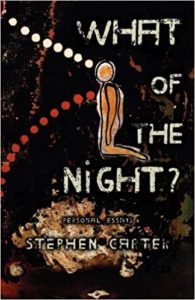 At Utah Valley University, he got an auspicious start as assistant to one of the 20th century’s leading Mormon intellectuals, Eugene England, helping him establish the world’s first Mormon Studies program. Inspired by England, Carter developed into a profound personal essayist. Early in the new millennium, his impactful essays began appearing in Sunstone, Dialogue, and elsewhere, including two stories about youthful faith coming into contact with the cold realities of mortality: “Weight of the Priesthood,” which was cited as “notable writing” in The Best American Spiritual Writing 2006, and “The Calling,” which won the 2008 AML Personal Essay Award. By 2010, Carter had amassed enough personal essays to publish his own book-length collection, What of the Night? (Zarahemla Books, 2010), of which Blair Hodges wrote: “These are essays without many neat endings . . . But Carter bears his testimony throughout the collection, his testimony of the plan of salvation; the messiness and the hope.” In parallel with his journey as an essayist, Carter earned an MFA degree in fiction and a PhD in narrative studies in cross-cultural education from the University of Alaska Fairbanks, as well as an MEd degree in curriculum and instruction from Montana State University, Bozeman.
At Utah Valley University, he got an auspicious start as assistant to one of the 20th century’s leading Mormon intellectuals, Eugene England, helping him establish the world’s first Mormon Studies program. Inspired by England, Carter developed into a profound personal essayist. Early in the new millennium, his impactful essays began appearing in Sunstone, Dialogue, and elsewhere, including two stories about youthful faith coming into contact with the cold realities of mortality: “Weight of the Priesthood,” which was cited as “notable writing” in The Best American Spiritual Writing 2006, and “The Calling,” which won the 2008 AML Personal Essay Award. By 2010, Carter had amassed enough personal essays to publish his own book-length collection, What of the Night? (Zarahemla Books, 2010), of which Blair Hodges wrote: “These are essays without many neat endings . . . But Carter bears his testimony throughout the collection, his testimony of the plan of salvation; the messiness and the hope.” In parallel with his journey as an essayist, Carter earned an MFA degree in fiction and a PhD in narrative studies in cross-cultural education from the University of Alaska Fairbanks, as well as an MEd degree in curriculum and instruction from Montana State University, Bozeman.
 At the other end of the literary spectrum from his (sometimes) serious, introspective essays, Carter played an integral role in founding and running The Sugar Beet, a satirical Mormon news outlet that made a cultural splash throughout Utah and beyond. In addition to coming up with the publication name, Carter was active on staff as both reporter and editor, writing stories with headlines such as “Man’s Addiction to Wife Destroying Relationship with Porn,” “Hofmann Forges Letters from Self,” “Arnold Friberg Body-Building Program Announced,” “Painter Greg Olsen Enters ‘Blue Period,’”, and the one that spawned a T-shirt: “Provo Temple Liftoff Successful.” Highlights from The Sugar Beet were collected in a volume titled The Mormon Tabernacle Enquirer (2007), which Publishers Weekly
At the other end of the literary spectrum from his (sometimes) serious, introspective essays, Carter played an integral role in founding and running The Sugar Beet, a satirical Mormon news outlet that made a cultural splash throughout Utah and beyond. In addition to coming up with the publication name, Carter was active on staff as both reporter and editor, writing stories with headlines such as “Man’s Addiction to Wife Destroying Relationship with Porn,” “Hofmann Forges Letters from Self,” “Arnold Friberg Body-Building Program Announced,” “Painter Greg Olsen Enters ‘Blue Period,’”, and the one that spawned a T-shirt: “Provo Temple Liftoff Successful.” Highlights from The Sugar Beet were collected in a volume titled The Mormon Tabernacle Enquirer (2007), which Publishers Weekly 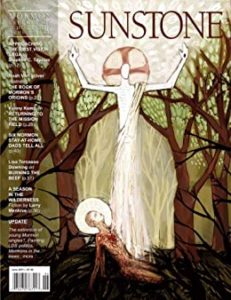 called “ruthlessly funny.” Carter’s writing in that book appears under the penname Teancum Zenos Smoot IV.
called “ruthlessly funny.” Carter’s writing in that book appears under the penname Teancum Zenos Smoot IV.
Since 2008 he has served as director of publications for the Sunstone Education Foundation, which includes editing Sunstone Magazine, where he has continued the tradition of talented editor-essayists who have helmed that magazine, and injecting more levity into the magazine than ever before. In recent years, he has worked diligently to restructure Sunstone as it moves into the digital age, including moving his essay writing into podcasts.
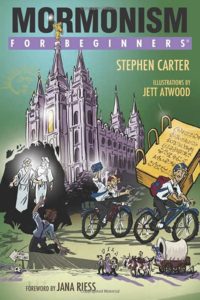 He has co-written three books with the comics artist Jett Attwood. They include the entertaining and informative Mormonism for Beginners (2017), and iPlates Volume 1 (2012) and Volume 2 (2014, AML award winner), graphic novel adaptations of the Mosiah chapters from the Book of Mormon. Scott Hales said of the first volume, “iPlates takes significant liberties with the scriptural accounts, creatively expanding the backstories of familiar figures like King Noah, Abinadi, Alma the Elder, and Gideon . . . [A big part of the] charm of iPlates is its humor. Compared to other Book of Mormon adaptations—in any
He has co-written three books with the comics artist Jett Attwood. They include the entertaining and informative Mormonism for Beginners (2017), and iPlates Volume 1 (2012) and Volume 2 (2014, AML award winner), graphic novel adaptations of the Mosiah chapters from the Book of Mormon. Scott Hales said of the first volume, “iPlates takes significant liberties with the scriptural accounts, creatively expanding the backstories of familiar figures like King Noah, Abinadi, Alma the Elder, and Gideon . . . [A big part of the] charm of iPlates is its humor. Compared to other Book of Mormon adaptations—in any 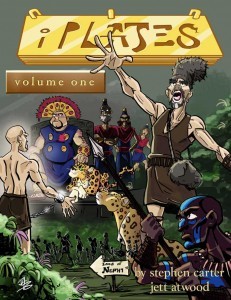 genre—iPlates is unmatched in its ability to make readers laugh. Carter’s Nephites use slang, crack witty jokes, and pick their noses. They’re also irreverent in goofy, non-offensive ways, like when Abinadi sports a crazy wig to disguise his true identity from King Noah’s guards. It’s possible that this “light” approach might upset recently-returned missionaries and older people in the ward, but such is to be expected, I suppose, with any kind of scriptural adaptation. I’m pretty sure, though, that most Mormons will get a kick out of iPlates. Especially kids. Kids will love iPlates.” iPlates is included on the AML’s 100 Works of Significant Mormon Literature.
genre—iPlates is unmatched in its ability to make readers laugh. Carter’s Nephites use slang, crack witty jokes, and pick their noses. They’re also irreverent in goofy, non-offensive ways, like when Abinadi sports a crazy wig to disguise his true identity from King Noah’s guards. It’s possible that this “light” approach might upset recently-returned missionaries and older people in the ward, but such is to be expected, I suppose, with any kind of scriptural adaptation. I’m pretty sure, though, that most Mormons will get a kick out of iPlates. Especially kids. Kids will love iPlates.” iPlates is included on the AML’s 100 Works of Significant Mormon Literature.
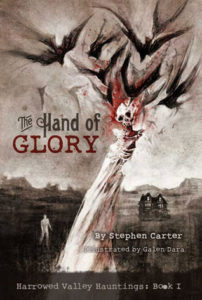 Stephen wrote several pieces of Mormon speculative fiction in the 2010s, including the YA horror novel The Hand of Glory (2013), about a Mormon family living in an old home with a tragic, polygamous past, and the chillingly imaginative short stories “Slippery” and “The Trail.”
Stephen wrote several pieces of Mormon speculative fiction in the 2010s, including the YA horror novel The Hand of Glory (2013), about a Mormon family living in an old home with a tragic, polygamous past, and the chillingly imaginative short stories “Slippery” and “The Trail.”
He edited the anthology Moth & Rust: Mormon Encounters with Death (2017), a collection of forty-six pieces in a wide variety of genres, including 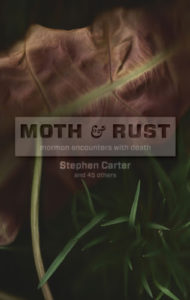 narrative essays, poetry, short fiction, theater, and visual art, which won an AML award. Susan Howe wrote, “It is original and extremely well-written . . . Carter has done an extraordinary job of weaving all these genres together so that in turning to the next piece, the reader is surprised and has to adjust expectations for how the narrative will develop.” It is also included on the AML’s 100 Works of Significant Mormon Literature.
narrative essays, poetry, short fiction, theater, and visual art, which won an AML award. Susan Howe wrote, “It is original and extremely well-written . . . Carter has done an extraordinary job of weaving all these genres together so that in turning to the next piece, the reader is surprised and has to adjust expectations for how the narrative will develop.” It is also included on the AML’s 100 Works of Significant Mormon Literature.
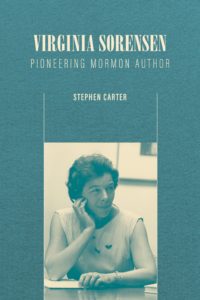 His most recent book is Virginia Sorensen, Pioneering Mormon Author (2023), a biography and critical analysis of the writings of one of the eminent Mormon authors of the 20th century. Carter forcefully argues that Sorensen’s novels from the 1940s–1960s can speak with meaning and healing power to both believing Mormons and post-Mormons today.
His most recent book is Virginia Sorensen, Pioneering Mormon Author (2023), a biography and critical analysis of the writings of one of the eminent Mormon authors of the 20th century. Carter forcefully argues that Sorensen’s novels from the 1940s–1960s can speak with meaning and healing power to both believing Mormons and post-Mormons today.
Whether as a creator of his own works or as a shepherd to the many other authors he has served as editor, Stephen Carter stands as one of the most influential forces in Mormon letters in this new millennium. We hope this this award signifies not just a heroic past but an even more impressive future.
Conversation with Stephen Carter and Angela Hallstrom, April 29, 2023
Note: The Smith-Pettit Foundation Award for Outstanding Contribution to Mormon Letters was established in 2005, and includes a monetary prize. In 2020 the AML board decided to transform the award to focus to excellent mid-career literary figures, encouraging them to continue producing artistic works of the highest quality.

.
Deeply deserved. Excellent choice.
Agreed!